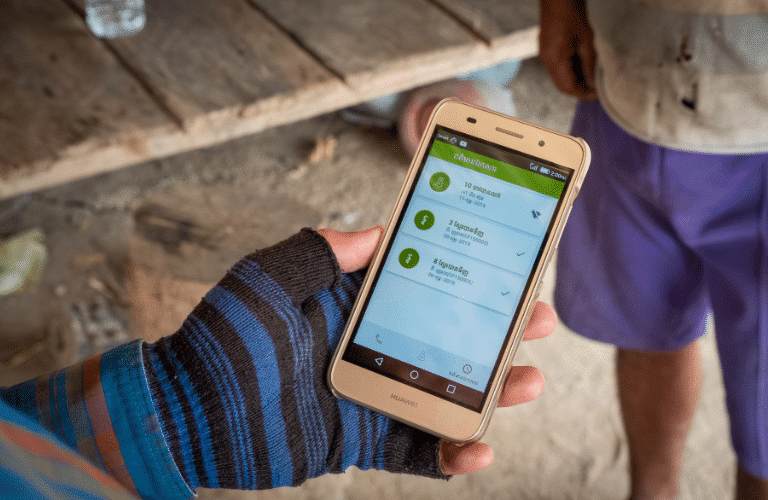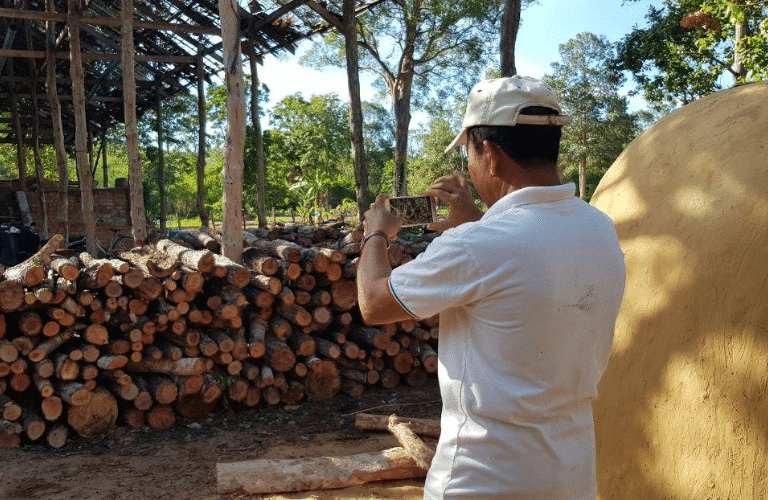Case study : in Cambodia, a sustainable charcoal value chain to combat deforestation
Heading to the Cardamom Massif. In 2016, Geres proposed a new business model with the “KjuonGo” concept: a sustainable, legal and traceable alternative value chain for charcoal. This model is based on connecting actors, optimizing logistics and traceability through a specific mobile application. At the end of 2022, the project will be completed: we take stock.
Case study presented in preview and realized for the Climate Chance Report
Cambodia is still heavily dependent on wood and charcoal for its energy needs (domestic cooking, catering, industrial heating and so on) and half the charcoal consumed in Phnom Penh comes from the Cardamoms mountain range. This primary forest hosts one of the last fauna and flora sanctuaries in the Mekong countries, but deforestation is threatening biodiversity and the landscape while exacerbating the climate risks and conflicts over land ownership or use.
Geres work targets the buffer zones of the Phnom Oral protected area, which offer essential natural protection against forest degradation and climate uncertainties but are seeing their integrity increasingly under threat from pressure on forest resources.
Learn more about the challenges of sustainable energy in Cambodia
Traditional charcoal production is often undertaken by migrants living along the illegal deforestation line. Combating this activity is difficult; the Forest Administration (AF) intervenes and destroys their kilns, but they move elsewhere and start again even though the work earns them very little.
KjuonGo, the challenge of launching a legal, sustainable, profitable value chain
Context. Geres has been working in Cambodia since 1994. Between 2003 and 2013, more than 3 million improved domestic stoves were produced and distributed with support from carbon finance. As of 2008, efforts began to improve traditional carbonization techniques and encourage sustainable forest management by the forest communities (FCs). In 2012, the Khmer Green Charcoal (KGC) initiative, dedicated to briquette production, became an independent social enterprise.
Since 2016, with support from the UNDP, Geres has promoted a new commercial model with the KjuonGo concept of an alternative sustainable, legal, traceable charcoal value chain. This model relies on stakeholder networking, optimization of logistics and traceability by means of a specific mobile app.
The charcoal producers connected with the FCs buy the sustainably harvested wood within the limit of the quotas authorized by the AF. The technical support provided has helped to improve production and the sustainable charcoal is distributed to customers under the KjuonGo brand.
From 2019 until 2022, the KjuonGo project has been part of the CEMAATERR[1] programme. KjuonGo involves the Pursat and Kampong Chhang provinces and is organized around two components: the community sustainable charcoal value chain and community plantations. It receives support from the French Development Agency, the Nordic Development Fund and the Maisons du Monde foundation.
Geres focuses on structuring the value chain by helping forest communities and charcoal producers with the technical and organizational aspects, as well as the local AF with legal charcoal production techniques. Commercial activities are handled by the KGC enterprise: ordering wood from the FCs, selling sustainable charcoal, monitoring of quality through to the final consumers, liaison with the national AF concerning the administrative procedures for legalization. Finally, KGC organizes the advertising campaigns while Geres educates textile factories about the use of sustainable biomass.
Community plantations make up the second project component, which is supporting community initiatives to reforest with native species and testing three alternative models: acacia planted on communal land, fruit trees planted on private land and commercial acacia plantations for firewood and products with greater added value.
[1] This article draws in particular on the evaluation report produced by ACK International for AFD and Geres : CEMAATERR Programme –”Climate – Energy: Adaptation and Mitigation in Rural Territories” – Final evaluation of Phase II – Country Component Note: Cambodia – 2022

Kjuongo: social, economic and environmental impacts
Over these three years, significant quantitative results have been obtained:
- 12 FCs and charcoal producers involved, observance of the quotas of 100% legal charcoal, 12 more efficient charcoal kilns built or renovated by the producers, a marketable product for KGC;
- 17 ha reforested, 13,000 seedlings produced in the nurseries, close to 9000 trees planted and 7400 ha of forest sustainably managed or protected by the communities, 7.5% of income generated by the FCs reinvested, primarily to finance patrols;
- Participatory production of maps (plantations, degraded areas, etc.) and action plans drawn up by the communities to protect and restore their forests.
Some initial positive impacts can be highlighted: social impacts with women’s involvement and acknowledgement of the status of charcoal producers, environmental impacts with reduced smoke emissions during carbonization, around 588 tonnes CO2 equivalent avoided (plus an estimated 4,800tCO2eq deforestation avoided) and a commercial community plantation model established, economic impacts with job creation (163 jobs created, mostly part-time, of which 54 for women), income generated, a viable activity for KGC.
The slowness of the Forest Administration in legalizing these activities and the fall in demand due to Covid19 health restrictions have, however, had a significant impact on the quantities of charcoal produced in three years: 74 tonnes of KjuonGo charcoal sold as against the projected 300.
The case of the charcoal producers is particularly interesting: legal activity improves their income as well as their social status. They had a very poor image: illegals engaged in hazardous work, comparable to poor people. KjuonGo has made it possible to register them officially. With a licence and status they can work by day, without having to hide, in safer conditions and with the prospect of technical advancement.

Promising results but serious challenges in scaling up
In 2022, the Geres project is coming to an end. It has enabled KGC and the communities to join forces to deliver charcoal with both environmental and social impacts. The barriers and levers for moving from this pilot phase to larger scale action have been identified. Even though the first criterion is still price, the social benefit is significant for both urban consumers and institutions. Sustainable charcoal purchase agreements have already been concluded between KGC and four charcoal producers and KGC is seeking finance from private investors.
Similarly, a partnership has been built up between KGC and the Forest Administration at national level. But will the latter go so far as to provide support through public funding, with the involvement of new FCs?
Furthermore, energy management is a topical subject in textile factories and 50 of them have committed to an energy diagnosis including biomass (Switch Garment project with Geres). The greater demands made by international brands as regards the fuels used by their suppliers offer outlets for wood produced in a legal, sustainable manner.
The ambition of the Geres project was to work on several innovations in terms of product, value chain, framework for dialogue and consultation and approach, combining the territorial and value chain approaches. Let us hope that its achievements will be enough to resist competition from the informal, unregulated charcoal production sector, which accepts no sustainability constraints on wood supply.
VOUS SOUHAITEZ AGIR EN FAVEUR DE LA SOLIDARITÉ
CLIMATIQUE ET SOUTENIR NOS ACTIONS ?
Dites-nous qui vous êtes et découvrez vos moyens d’action
CITOYEN·NE·S
Parce que la Solidarité climatique est l’affaire de toutes et tous, le Geres vous donne les clés pour passer à l’action.
ENTREPRISES
En tant que dirigeant·e d’entreprise, employé·e ou client·e responsable, vous avez le pouvoir d’agir au quotidien.
INSTITUTIONS & COLLECTIVITÉS
Soutenez nos actions en France et à l’international et devenez un acteur de la Solidarité climatique.
FONDATIONS
En vous engageant aux côtés du Geres, vous contribuez à la mise en œuvre d’actions innovantes et concrètes.
